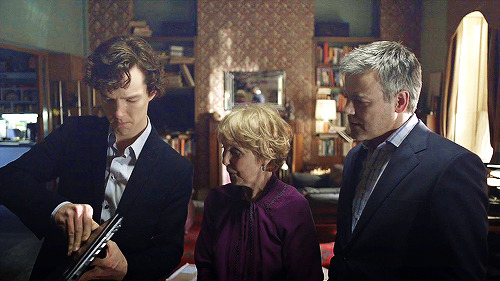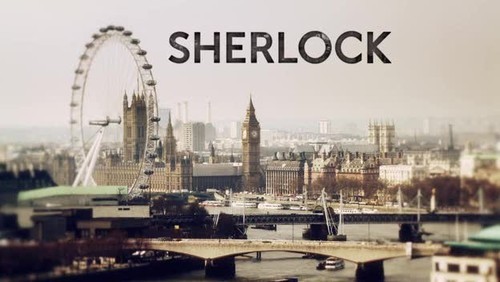I'm not sure whether to attribute this to my eldest brother or his awesome wife, but some time back they informed me that I needed to watch Sherlock, an interesting sounding series being produced across the pond for BBC. It took me a while to finally watch it, but I'm glad I did; BBC's Sherlock is easily one of the best dramas being produced today.
Sherlock, as the title should suggest, is yet another adaptation of Sir Arthur Conan Doyle's famous serial detective stories; it differs from other adaptations, however, in that it's a modernized version, with 21st century incarnates of all the original characters using modern tools to solve crimes based on Conan Doyle's stories.
I would say that I usually don't like modernized versions of classic stories, but I'd be lying; I love modernizations. Some can be pretty terrible, because so much work has to go into keeping the originality of the piece, but when they're done well they can be extremely good.

Sherlock is extremely good.
The first episode, A Study in Pink, is based on the first half of Conan Doyle's first Holmes novel, A Study in Scarlet, and it introduces us to our main duo, Sherlock Holmes played by Benedict Cumberbatch and Dr. John Watson played by Martin Freeman, during their first meeting. As I'm a Yank with limited knowledge of foreign actors (Heck, I'd even describe my knowledge of American actors as 'limited'), neither of these names meant anything to me when I started the series, though I could assume they were reasonably well known actors.
Six 90 minute episodes later, and I can confidently say that both of these actors deserve their growing fame. Cumberbatch is completely believable as the brilliant and aloof detective, able to solve any mystery with some quick deducing, and Freeman balances him out perfectly as Watson, arguably the more difficult of the two roles. Having seen this series, I now feel I owe it to the actors to watch anything else they've done.
Each hour-and-a-half long episode is either based on a famous Conan Doyle story or around elements from multiple stories. There are many allusions to he original text throughout the series, from dialogue to minor plot elements, each given a 21st century spin, and in my opinion everything works together surprisingly well. Nothing is ever out of place or forced. However, I have the unique position of someone who understands many Sherlock Holmes references, but hasn't actually read any Conan Doyle, so perhaps my opinion may not matter much to any 'true fans'.
Probably my favorite thing about the series is their use of on-screen text. Sherlock's character, as you might imagine, is very smart and processes things pretty quickly, so to show us how his mind is working they utilize typography (similar to Stranger than Fiction, tho' in most cases Sherlock's isn't animated). They also have on-screen text whenever a character received a text message on their phone, which I think is much easier on the audience than having the camera read the message over the character's shoulder.
There's also much about the music and camera work. I'm sure a handful of people might complain that Sherlock feels a bit 'artsy' because of the awesome camera work, but I think those people just want to find something to complain about. Add the wonderful scene set-up to the fact that Sherlock was shot with a single-camera (meaning that every scene with multiple angles has to be shot angle by angle) and you can see why I want to congratulate the entire production crew.
 |
| Sherlock, Mrs. Hudson, and DI Lestrade, respectively. |
 The second season, which just finished airing in the UK and is scheduled to air on PBS in May, focuses on more emotional development of the characters, and after such an astounding first season I was surprised that the writers found a way to go above and beyond. I wont give any spoilers, but the final episode was so emotionally tense, and I'm now dying for more after that unexpectedly dramatic cliff-hanger.
The second season, which just finished airing in the UK and is scheduled to air on PBS in May, focuses on more emotional development of the characters, and after such an astounding first season I was surprised that the writers found a way to go above and beyond. I wont give any spoilers, but the final episode was so emotionally tense, and I'm now dying for more after that unexpectedly dramatic cliff-hanger.Unfortunately it looks like Season 3, which has been confirmed, may not be coming out until late 2013. This is the problem with my getting interested in quality fiction: just as soon as I become interested, there becomes a long wait before we get any more.
Sherlock is definitely worth the wait, however; a show this intelligent isn't always something easy to find.


No comments:
Post a Comment